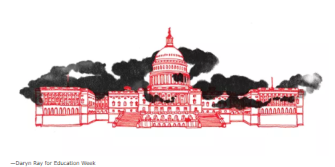
Education Week has released its second annual “Big Ideas” report that focuses on issues that could reshape the conversation and decisions around schools.
For the report, I looked at why teachers don’t trust a growing array of institutions and organizations. The piece examines the lack of trust among educators that extends to local, state, and the federal government, the media, and philanthropic groups. This distrust of large, often high-profile organizations in education was highlighted by last year’s wave of teacher strikes and protests, but the issue runs deeper than just those public displays of discontent, and reaches back decades.
I also examine where many teachers are increasingly placing their trust. The short answer? Each other.
I spoke to Peter Greene, a long-time Pennsylvania teacher who previously blogged for Education Week, about this issue. He said that for some of his peers, there’s been some reluctance to let go of the trust they had in institutions—but increasingly, they see the shift in education policies as a betrayal, and a departure from the “benign neglect” many of them expected and live with for a long time.
“I think there is a growing lack of trust,” Greene said. “Innovation fatigue is definitely a real thing. ... The classroom opinion is not respected or asked for.”
Some teachers like Greene are forming their own online communities, bolstered in part by social media, to discuss classroom and broader issues facing them. But Robert Pondiscio, a senior fellow and vice president at the Thomas B. Fordham Institute who also taught in New York City, said that while highly engaged teachers might find refuge and build trust that way, organizations involved education should still keep in mind how to help average teachers get better.
“For some small but hopefully significant number of teachers, these kind of self-organizing communities ... are going to be liberating,” Pondiscio said. “But we still have a labor force that may be beyond the reach of those.”
